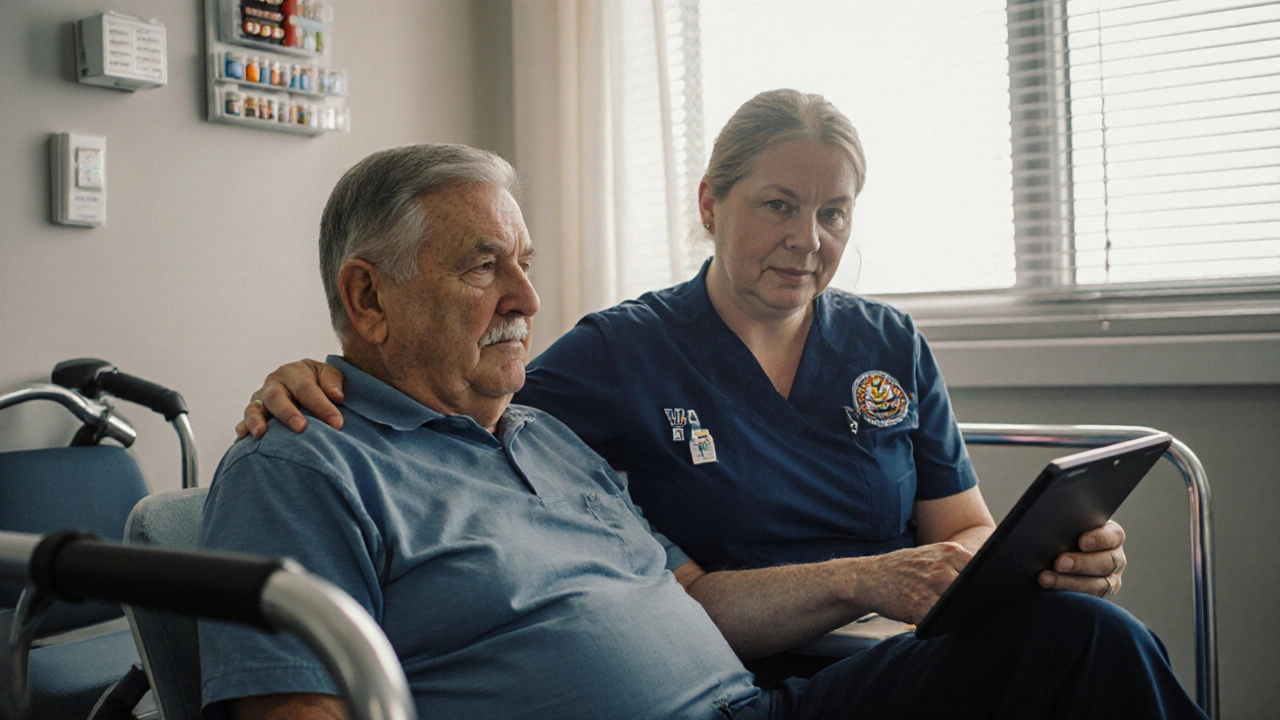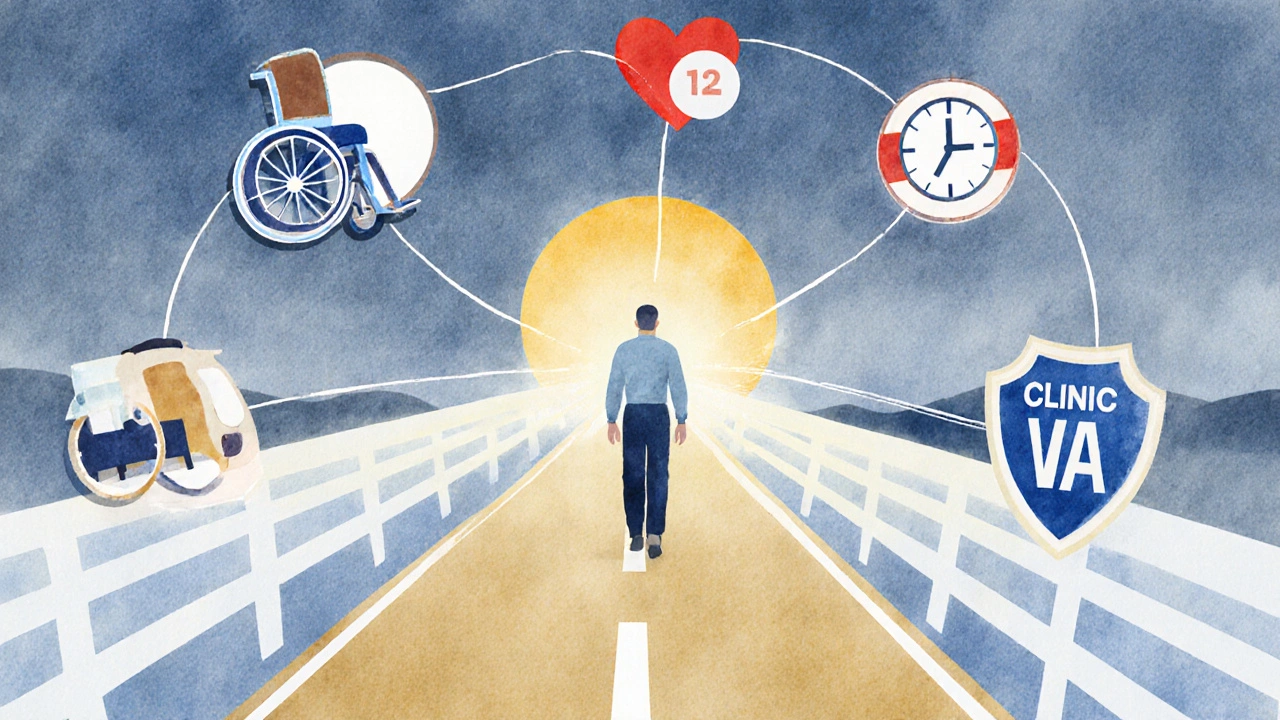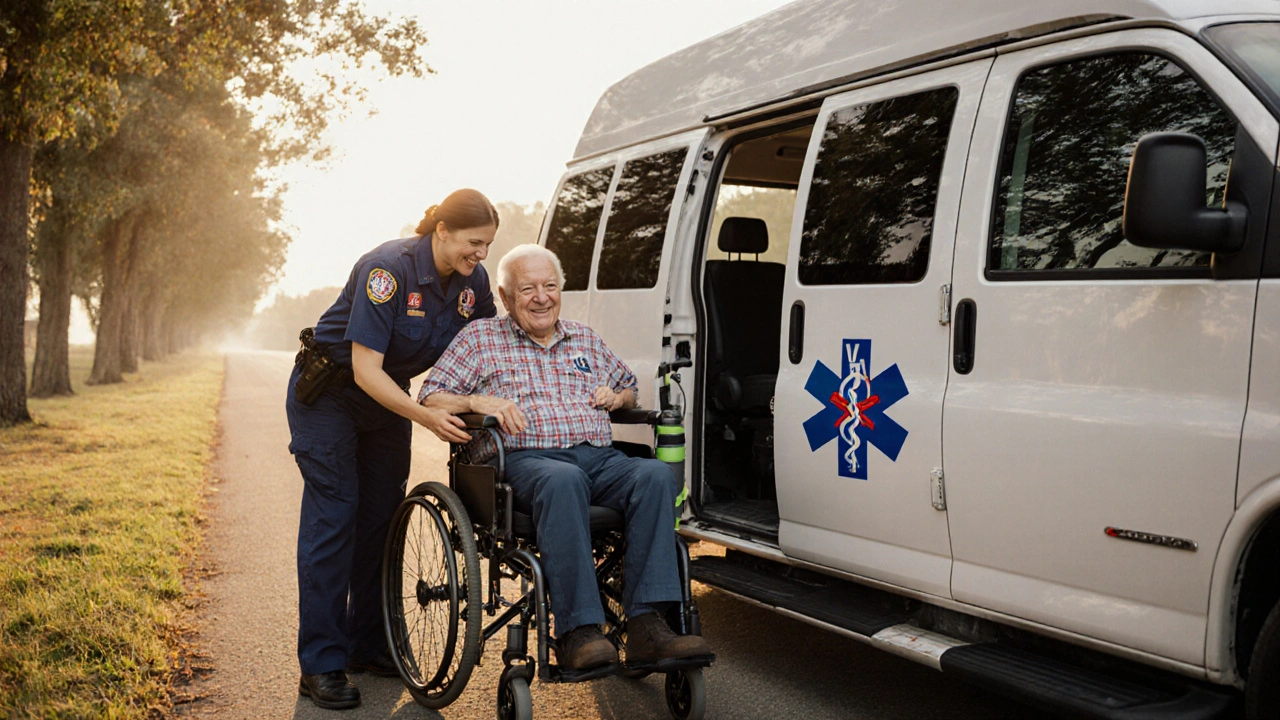If you’re a veteran relying on VA healthcare, getting to your appointments shouldn’t be a battle. Yet, many veterans face real barriers-no car, no driver, long distances, or physical limitations that make travel difficult. That’s where VA medical escort services come in. These aren’t luxury perks. They’re part of your earned benefits, designed to make sure you get the care you need, when you need it.
What Exactly Is a Medical Escort Service?
A medical escort service isn’t just a ride to the clinic. It’s a trained professional who accompanies you from your home to your medical appointment and back. They help with mobility, carry medical equipment, manage medications, and offer emotional support. Think of them as a bridge between your needs and the healthcare system.The VA provides these services through its Non-VA Medical Care program, especially when transportation is medically necessary. This means if your doctor says you can’t travel safely alone-due to a recent surgery, chronic illness, cognitive decline, or severe mobility issues-the VA will arrange and pay for an escort.
Who Qualifies for VA Medical Escort Services?
You don’t need to be 100% disabled to qualify. The VA looks at your medical need, not just your disability rating. You’re eligible if:- You’re enrolled in VA healthcare
- Your condition makes it unsafe or impossible to travel alone
- Your appointment is for a VA-approved service (like chemotherapy, dialysis, physical therapy, or mental health counseling)
- You don’t have access to reliable transportation from family, friends, or public transit
Even veterans with low income or no private insurance can qualify. The VA doesn’t turn anyone away based on financial status if the medical need is documented.
How to Request a Medical Escort
Getting started is simpler than most veterans think. Here’s how:- Ask your VA provider or care coordinator if you qualify for medical transportation. Say: “I need help getting to my appointments because of my condition.”
- Your provider will fill out a VA Form 10-3642 (Transportation Request Form) or use the electronic system in your My HealtheVet account.
- Include details: appointment date, time, location, and why you need an escort (e.g., “uses wheelchair,” “has severe PTSD triggers during travel,” “cannot stand for more than 10 minutes”).
- Submit the request at least 72 hours in advance. For urgent cases, call your local VA Medical Center’s Transportation Office directly.
Some VA facilities have dedicated transportation coordinators. If you’re unsure who to call, ask for the “Veteran Transportation Coordinator” at your nearest VA hospital. They handle everything from scheduling to assigning the right type of escort.
Types of Medical Escorts the VA Provides
The VA doesn’t use one-size-fits-all transport. They match the service to your needs:- Non-Emergency Medical Transportation (NEMT): Wheelchair vans, stretcher-equipped vehicles, or sedans with ramps. Drivers are trained in basic first aid.
- Medical Escort (Companion): A trained aide who rides with you, helps you in and out of the vehicle, carries your oxygen tank or walker, and stays with you during your appointment.
- Specialized Escorts: For veterans with cognitive impairments (like dementia or TBI), a trained behavioral escort may be assigned to manage anxiety or confusion during travel.
- Telehealth Accompaniment: If you’re doing a video visit from home, the VA can send a tech assistant to help set up your device, ensure connectivity, and explain instructions afterward.
These services are free. No copay. No hidden fees. The VA covers the full cost.

What If You’re Not Near a VA Hospital?
Many veterans live in rural areas where VA facilities are hours away. The VA still has you covered. Through the Veterans Crisis Line and the VA’s Community Care Network, you can access medical escort services even if you’re seeing a non-VA provider-so long as the appointment was pre-approved by the VA.For example, if you’re scheduled for a specialist visit at a private clinic in a small town, the VA can arrange for a local medical escort service to pick you up, drive you there, wait while you’re seen, and bring you home. They even cover parking fees and meal allowances if your appointment lasts more than six hours.
Common Mistakes Veterans Make
Many veterans miss out on these benefits because they assume:- “I don’t need help-I can manage.” Even if you think you can handle it, if you’re at risk of falling, getting lost, or having a medical episode during travel, you’re eligible. Don’t wait until you’re in crisis.
- “I have to be 100% disabled.” Wrong. Veterans with 10%, 30%, or 70% ratings qualify if their condition makes travel unsafe.
- “I need to call the VA right before my appointment.” Requests need 72 hours’ notice. Last-minute calls often mean delays or cancellations.
- “My family will drive me.” If your family is unavailable, elderly, or unable to assist, the VA will step in. You don’t have to burden loved ones.
Real-Life Example: James, 72, Vietnam Veteran
James has Parkinson’s and lives in a rural county with no public transit. His VA appointments are 45 minutes away. For years, he skipped follow-ups because he couldn’t get there. His wife, who used to drive him, had a stroke last year.His VA primary care provider noticed he hadn’t shown up in six months. They reached out, assessed his mobility, and enrolled him in the medical escort program. Now, a trained escort picks him up every Tuesday at 7 a.m., helps him into the van, stays with him during his neurology visit, and brings him home by noon. James hasn’t missed an appointment since.
“It’s not just a ride,” James says. “It’s someone who checks if I’m okay, reminds me to take my pills, and makes sure I don’t get lost. That’s dignity.”
What About Family Members?
The VA doesn’t pay for family members to accompany you unless they’re acting as your official medical escort-meaning they’re trained and contracted by the VA. But if you need someone to be with you for emotional support, you can request that the escort be someone you trust, like a VA-approved volunteer or a family member who completes a short orientation.Some VA centers partner with local organizations like the American Legion or VFW to provide volunteer escorts. These volunteers are background-checked, trained in veteran-specific needs, and often have military experience themselves.

What If Your Request Is Denied?
If the VA denies your request, it’s not the end. You have rights:- Ask for a written explanation of the denial.
- Appeal within 60 days by contacting your VA Patient Advocate.
- Request a second medical opinion from another VA provider to support your need for transport.
Many denials happen because paperwork is incomplete. Make sure your provider clearly states “medically necessary” and “cannot travel alone due to [specific condition].” Vague language like “would be helpful” won’t cut it.
How to Stay on Top of Your Benefits
Keep track of your transportation benefits:- Log into your My HealtheVet account and check the “Transportation” section under “Appointments.”
- Save the phone number of your local VA Transportation Office. It’s often different from the main hospital line.
- Set calendar reminders for your next appointment and schedule your escort at least a week ahead.
- Ask your care team to add a transportation note to your medical file so future providers know your needs.
Don’t assume your benefits stay the same. If your condition changes-say, you lose mobility after surgery-reapply. The VA will reassess your needs.
Other VA Benefits That Help With Travel
Medical escort services aren’t the only travel-related benefit you might qualify for:- Travel Reimbursement: If you use your own car, the VA pays 41.5 cents per mile (2025 rate) plus parking and tolls.
- Per Diem Allowance: If your appointment requires an overnight stay, you may get up to $53 per day for meals and lodging.
- VA Air Transportation: For veterans needing long-distance travel (like from Alaska to a VA specialty center), the VA may arrange free flights through the Air Transportation Program.
These benefits stack. You can get an escort AND mileage reimbursement if you use your car for part of the trip.
Final Thought: You Earned This
You served your country. The VA’s medical escort services aren’t charity-they’re part of the promise made to you. Getting to your appointments shouldn’t be a source of stress, fear, or isolation. These services exist to honor your service by ensuring you get the care you need, safely and with dignity.Don’t wait until you’re stuck at home. Reach out today. Your next appointment shouldn’t be a battle you fight alone.
Do I have to pay for VA medical escort services?
No. VA medical escort services are completely free for eligible veterans. There are no copays, no hidden fees, and no income requirements. The VA covers the full cost of transportation and escort services when medically necessary.
Can I choose who accompanies me?
You can request a specific type of escort, like someone trained in dementia care or a veteran volunteer. The VA will try to match your needs. If you want a family member to be present, they can attend as a companion, but they won’t be paid unless they’re officially contracted as a VA escort.
How far in advance do I need to request a medical escort?
You should request a medical escort at least 72 hours before your appointment. For routine appointments, booking a week ahead is best. Emergency or last-minute requests may be approved, but there’s no guarantee of availability.
What if I need help getting to a non-VA doctor?
Yes, if your appointment is approved by the VA under the Community Care Program. The VA will arrange and pay for transportation to any pre-approved provider, whether it’s a private clinic, hospital, or specialist office. Just make sure your VA provider has authorized the visit first.
Can I use medical escort services for mental health appointments?
Absolutely. Mental health appointments are covered just like physical ones. If anxiety, PTSD, depression, or cognitive issues make it hard for you to travel alone, you qualify for an escort. Many veterans find that having a calm, trained companion reduces panic and makes therapy much more effective.
What if I live in a rural area with no VA facility nearby?
The VA’s Community Care Network includes medical escort services across all 50 states, even in remote areas. You can be picked up from your home and taken to the nearest approved provider. The VA coordinates with local transport providers to ensure coverage, no matter where you live.
Do I need to reapply every year?
No. Once you’re approved for medical escort services, your eligibility continues as long as your medical need remains. But if your condition improves or changes, the VA may review your case. Always update your care team if your mobility or health changes.
Can I get help with transportation for family members?
The VA only covers transportation for the veteran. Family members must arrange their own travel. However, if a family member is acting as your official medical escort and meets VA training requirements, they may be paid to accompany you.
